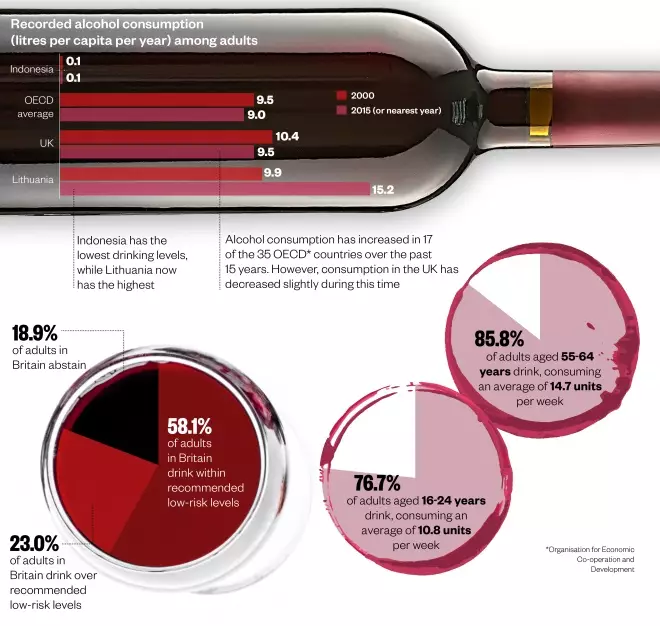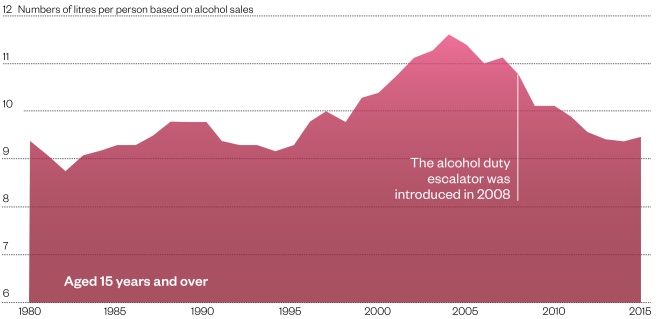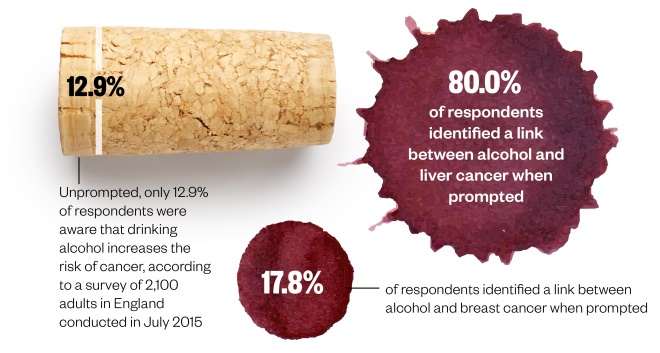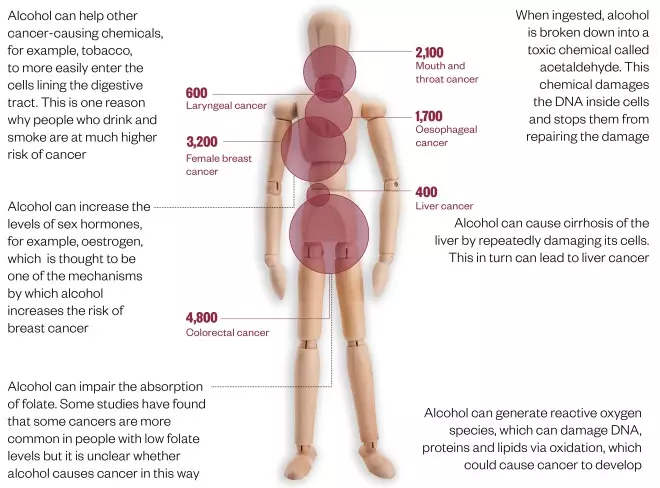To view the full infographic, click here.

Alcohol consumption wordwide and drinking levels in Britain
Source: Health at a glance 2017, Health Survey for England 2016, Scottish Health Survey 2016, National Survey for Wales 2016–17
Although average alcohol consumption in the UK has decreased slightly over the past 15 years, 23.0% of adults in Britain drink over recommended low-risk levels

Evolution of alcohol consumption in the UK
Source: British Beer and Pub Association Statistical Handbook 2017
Alcohol consumption is now lower than its peak in 2004, however, this is largely due to a sharp decline in drinking among younger age groups, with consumption among older age groups remaining relatively stable or even increasing

Current recommended low-risk drinking levels
Source: UK chief medical officers’ low risk drinking guidelines
The Chief Medical Officers’ guidelines were revised on 8 January 2016 and apply to both men and women. To keep health risks from alcohol to a low level follow these steps

Awareness of the link between alcohol consumption and cancer risk
Source:
BMC Public Health 2016;16:1194
Drinking alcohol increases the risk of seven types of cancer. Between 4%–6% of all new cancers in the UK in 2013 were caused by alcohol consumption. Even drinking small amounts increases the risk of some cancers and the International Agency for Research on Cancer (IARC) has classified alcohol as a group 1 carcinogen. However, only 13% of adults are aware of the link.

Magnitude of risk
Source:
British Journal of Cancer 2015;112:580
A meta-analysis of over 570 observational studies including almost 500,000 cases calculated relative risks (RR) of site-specific cancer for drinkers compared with non-drinkers and occasional drinkers for various types of cancer.

Estimated annual cancer cases attributable to alcohol in the UK, 2011
Source: Cancer Research UK
There are multiple ways in which alcohol is thought to increase the risk of cancer.

What can pharmacists do?
Source:
British Journal of General Practice 2016;66:e1
Some community pharmacies in the UK provide alcohol screening and brief intervention services. However, there is a huge unmet need for interventions.
Starting a conversation about alcohol
It can be difficult to start conversations with your patients about their alcohol consumption. The World Health Organization has published a training manual for primary care on alcohol brief interventions. It suggests the following conversation starters:
1. Opportunistic (practitioner-led):
Practitioner links the presenting issue (social/medical/other) to alcohol
- Another aspect that can affect your condition is lifestyle, including drinking alcohol. Do you enjoy a drink? Could we talk about that a little?
- Some people with similar symptoms find that these issues can be affected by their alcohol use, without them realising. Can I ask you, do you drink alcohol?
- Some people find that alcohol helps them to (relax when they’re stressed; sleep when they have problems with sleeping, escape from their worries). How have you been coping?
- It is surprising how even small amounts of alcohol can affect the symptoms you describe or the reason for your visit. By exploring your alcohol use we would be in a better position to know if this was a factor for you. Would that be okay? Can I ask you what you would usually drink in a week?
- We find that for many people who (get into fights or arguments, fall and injure themselves, can’t sleep), alcohol can be a factor. Do you think your attendance here today is connected to alcohol in any way?
- We’ll come back to treatment options in a moment, but one thing that might help us to get to the bottom of this is alcohol. Do you drink at all?
- I’m wondering if there are any other factors that might be affecting you at the moment. Something that we haven’t picked up yet is alcohol. What do you know about how alcohol can affect this?
2. Patient-led:
Patient mentions alcohol
- It sounds as if you’ve been worrying about your drinking. Would you like to talk about that?
- You’ve mentioned that you’ve stopped drinking just now. Is there a particular reason for that?
- You mentioned that you were very drunk on Friday so are not clear how (an incident or injury) happened. Did you drink more than usual?
- Actually, I’ve got some information here about alcohol that I can give you to take away with you. Is drinking something that you’re concerned about just now?
- You mentioned that your wife has been telling you to cut back on your drinking. She obviously cares about you. What about you, do you think you should cut down?
3. Planned (practitioner-led):
Practitioner mentions alcohol to all patients or all those in a particular group
- We ask everyone who registers as a new patient some general lifestyle questions, and next on the list is alcohol. Would it be okay if I ask you about that?
- We find that people who are in your situation (homeless, carers, involved in offending, bereaved, traumatised, have family members who drink) can sometimes end up drinking more than they might want to. Is that something that you can relate to at all?
- We are taking part in a new programme or campaign, and we’re talking to everyone we see about their alcohol use. Would you mind if I ask you a few questions about this?
- We find that many of the people who visit the practice for (disease/condition) find their symptoms improve if they cut down on their alcohol consumption. So now we ask everyone here for (disease/ condition) about that. Do you drink alcohol at all? Would you mind if I ask you a few questions?
Other resources
Other useful resources on alcohol brief interventions can be found at Public Health England’s Alcohol Learning Centre.
Reading this article counts towards your CPD
You can use the following forms to record your learning and action points from this article from Pharmaceutical Journal Publications.
Your CPD module results are stored against your account here at The Pharmaceutical Journal. You must be registered and logged into the site to do this. To review your module results, go to the ‘My Account’ tab and then ‘My CPD’.
Any training, learning or development activities that you undertake for CPD can also be recorded as evidence as part of your RPS Faculty practice-based portfolio when preparing for Faculty membership. To start your RPS Faculty journey today, access the portfolio and tools at www.rpharms.com/Faculty
If your learning was planned in advance, please click:
If your learning was spontaneous, please click:
References
Infographic: MAG
Images: Shutterstock.com
Editorial advisers: Colin Angus, research fellow, Sheffield Alcohol Research Group, University of Sheffield; Katie Edmunds, health information officer, Cancer Research UK; Niamh Fitzgerald, lecturer in alcohol studies, University of Stirling, Colin Drummond, professor of addiction psychiatry, King’s College London

